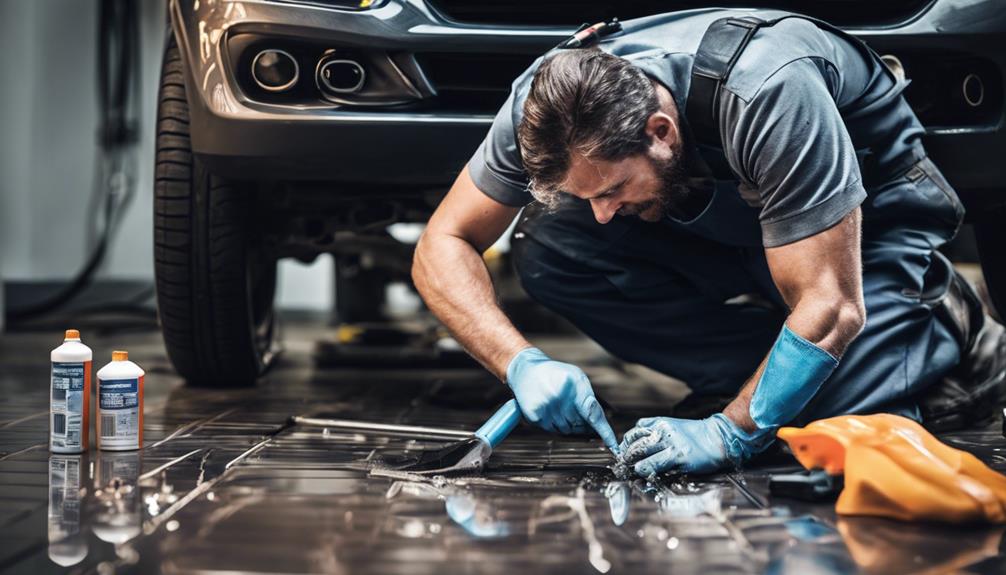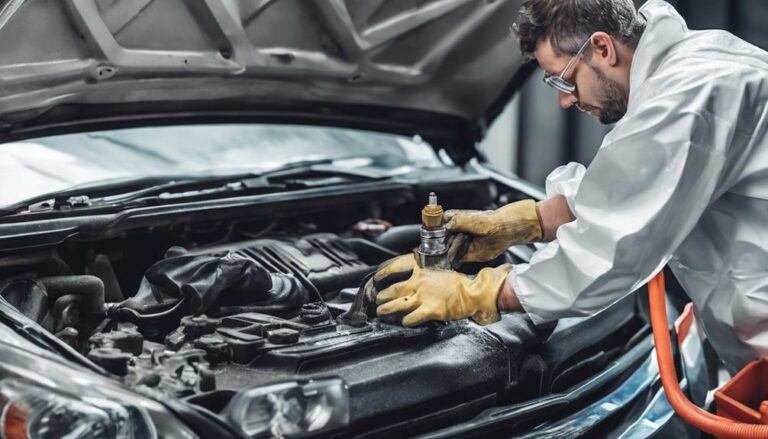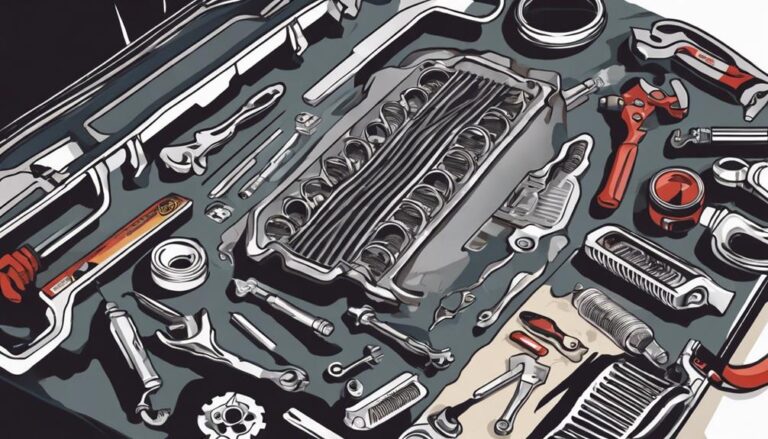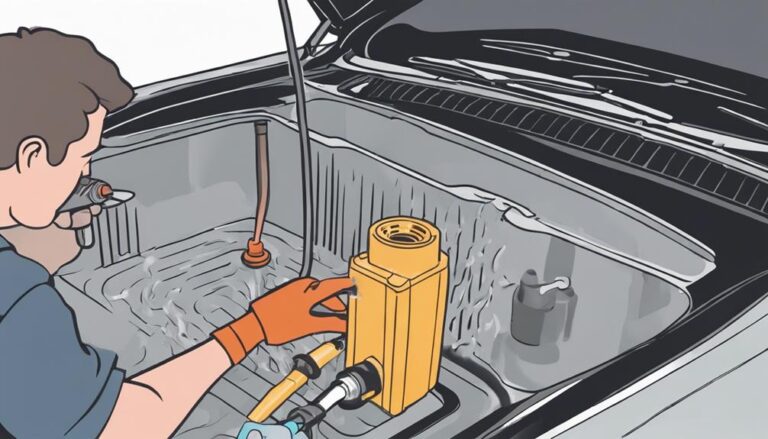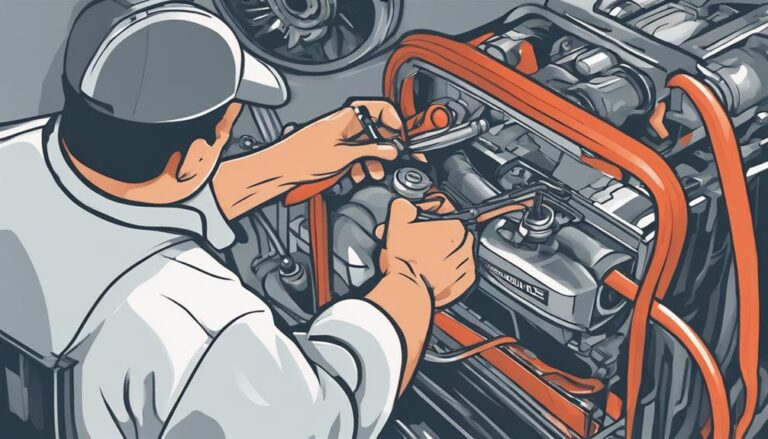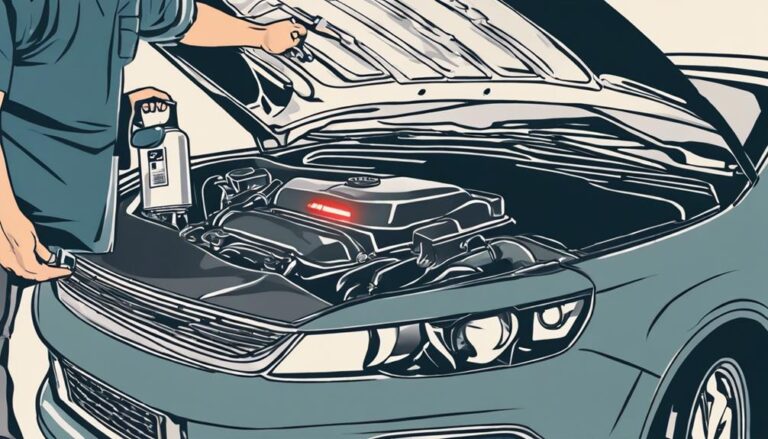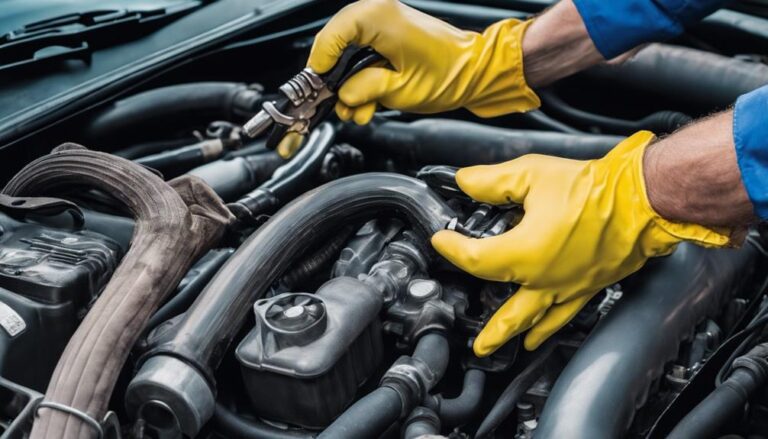7 Best Signs of Radiator Leak Repair
If you've noticed a sudden drop in your vehicle's coolant level, you might be experiencing a radiator leak.
Understanding all the signs that point to radiator leak repair is essential for maintaining your car's performance and longevity.
From visible puddles under your car to a hissing sound coming from the radiator, each symptom plays a crucial role in diagnosing and fixing the issue before it escalates.
Stay tuned as we uncover the remaining indicators that could save you from costly repairs down the road.
Key Takeaways
- Sudden drop in coolant level signals radiator leak
- Visible puddles indicate need for repair
- Address overheating promptly to prevent damage
- White smoke and sweet smell are signs of urgent radiator attention
Sudden Drop in Coolant Level
If you notice a sudden drop in your coolant level, it's crucial to address this issue promptly as it could indicate a potential radiator leak requiring immediate attention. Regular coolant inspection is vital to catch such issues early. By monitoring the coolant level and topping it up frequently, you can assess the severity of a radiator leak. Coolant loss not only affects the efficiency of your vehicle's cooling system but can also lead to engine overheating and significant damage if left unattended.
To detect leaks, keep a close eye on the coolant reservoir and radiator levels. Any sudden changes in these levels should be investigated promptly. Addressing a sudden drop in coolant level can prevent costly repairs and potential engine issues down the line. Leak detection is a critical aspect of vehicle maintenance that shouldn't be overlooked. By staying vigilant and proactive, you can ensure the longevity and optimal performance of your vehicle.
Visible Puddles Under Your Car
When you spot bright green, yellow, or blue puddles under your car, it may indicate a potential radiator leak repair. Identifying the color of the puddle is crucial in leak detection. Here's what to look for:
- Color Identification: Keep an eye out for bright green, yellow, or blue hues under your car. These colors are typical indicators of coolant leaks that may require radiator repair.
- Leak Detection: If the puddle feels greasy to the touch, it likely confirms a coolant leak, emphasizing the need for prompt repair.
- Distinctive Smell: A sweet smell emanating from the puddle sets it apart from water leaks. This odor signifies the presence of coolant and signals the necessity for radiator leak repair.
Properly identifying these visible puddles beneath your vehicle is essential for addressing any radiator issues promptly and avoiding potential damage.
Overheating Engine
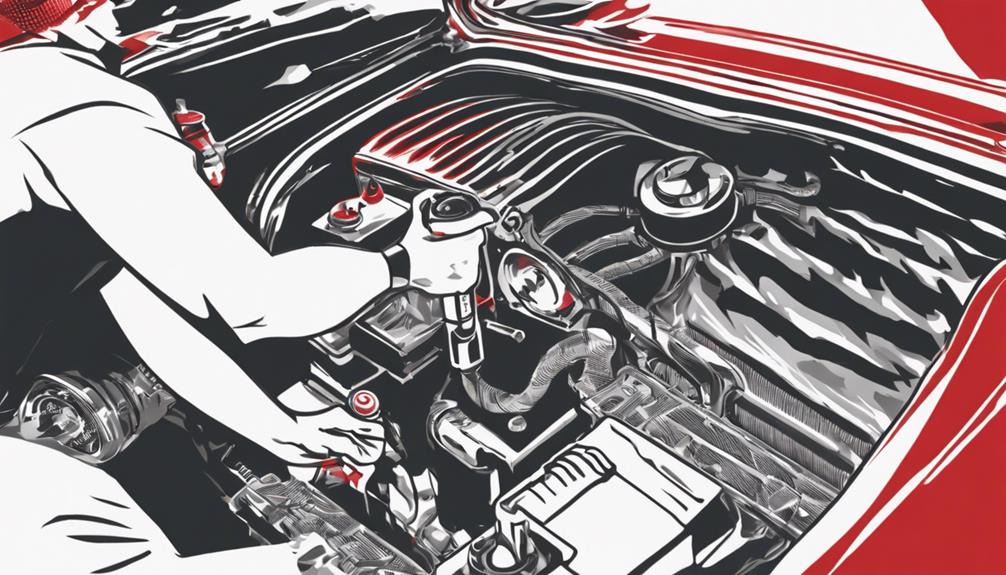
Observing an overheating engine is a clear indication that your vehicle may require immediate attention to address potential radiator leak repair.
An overheating engine is a common symptom of a radiator leak, signifying a loss of coolant circulation within the cooling system. Preventive maintenance plays a crucial role in averting engine overheating, which can lead to severe damage impacting your vehicle's performance.
Monitoring the temperature gauge and acting promptly upon overheating issues can prevent further harm to your engine. Radiator leak repairs are essential to sustain proper engine temperature regulation and avert potential engine failure.
Seeking professional assistance for radiator leak repair ensures a comprehensive diagnosis and an effective solution to prevent engine overheating. By prioritizing the cooling system's integrity through timely repairs, you can maintain your vehicle's optimal performance and longevity, safeguarding it from the detrimental effects of engine overheating.
Sweet Smell Inside the Car
Curiously, have you ever noticed a sweet smell inside your car that resembles maple syrup? This aromatic diagnosis could be signaling a potential radiator leak, specifically due to ethylene glycol, a component found in radiator coolant. To further clarify this issue, consider the following:
- Distinct Sweet Odor: If a maple syrup hint lingers inside your vehicle, it might indicate a coolant leak.
- Heating System Alert: Detecting this scent while driving suggests a coolant leak in the heating system.
- Timely Action: Promptly addressing the sweet smell is crucial to prevent further damage and ensure safe vehicle operation.
When faced with such a scent, seeking professional assistance for radiator leak repair is imperative. Addressing the issue promptly not only eliminates the sweet smell but also maintains the integrity of your vehicle's cooling system. Remember, early detection and intervention can save you from costly repairs down the road.
White Smoke From Exhaust
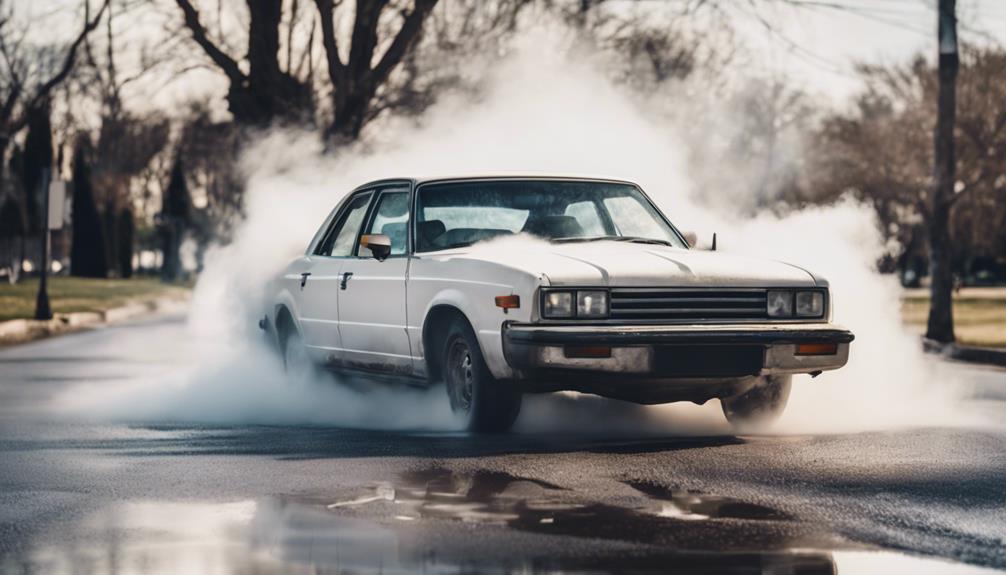
If you notice white smoke emanating from your exhaust, it could be a clear indication of coolant leaking into the combustion chamber. When coolant mixes with fuel during combustion, it produces a distinctive white smoke, different from regular exhaust fumes. This occurrence often points to a leaking head gasket or a cracked engine block, causing combustion issues and potentially leading to engine damage.
Addressing this white smoke promptly is crucial to prevent further harm to your engine. Ignoring the issue could result in severe consequences, affecting the engine's performance and longevity. By recognizing and acting upon the presence of white smoke from your exhaust, you can effectively diagnose and repair radiator leaks before they escalate into more significant problems.
Discolored Coolant
Discolored coolant in your radiator system may indicate the presence of contaminants or rust, potentially signaling internal corrosion within the engine components. When facing this issue, it's crucial to take preventive measures and perform proper cooling system maintenance to avoid further damage.
Here are some key points to consider:
- Regular Inspection: Check your coolant regularly for any discoloration, as it can be an early sign of problems within the radiator system.
- Timely Action: Address any signs of discolored coolant promptly to prevent exacerbation of internal corrosion and potential damage to engine components.
- Cooling System Maintenance: Ensure you adhere to the recommended maintenance schedule for your cooling system to keep it functioning efficiently and prevent issues like coolant discoloration.
Hissing Sound From the Radiator
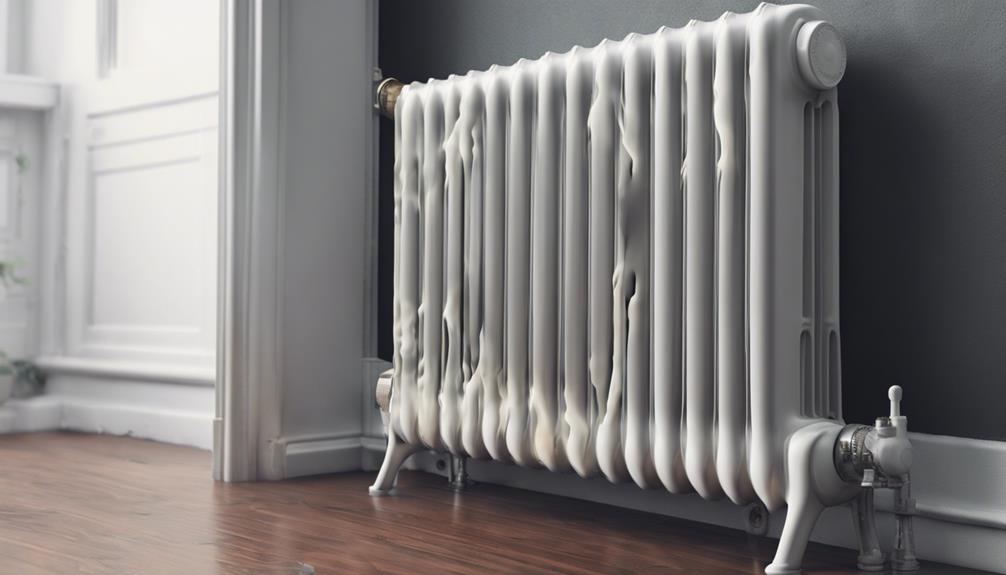
If you hear a hissing sound emanating from your radiator, it's a clear sign that a leak repair is necessary.
This noise indicates coolant is escaping under pressure and immediate action is crucial.
It's advisable to seek professional inspection to accurately diagnose and address the issue to prevent further damage.
Audible Hissing Indicates Leak
Upon hearing an audible hissing sound emanating from your radiator, it's crucial to promptly address this indication of a potential leak in the cooling system. The hissing noise results from the release of pressurized coolant or steam from the radiator, signifying a problem that requires immediate attention.
When faced with this issue, consider the following:
- Check for visible signs of coolant leaks under the vehicle.
- Listen for any unusual sounds in the vicinity of the radiator.
- Monitor the temperature gauge for any irregularities that could indicate a leak.
Being proactive in addressing these audible warnings can help prevent further damage to your engine. Remember, seeking professional assistance for radiator leak repair is advisable in such situations.
Immediate Action Required
When hearing a hissing sound emanating from your radiator, immediate action is crucial to address the pressurized leak and prevent potential engine damage. Ignoring this warning sign can lead to overheating and costly repairs. Here are some DIY repairs and temporary fixes you can consider while waiting for professional help:
| DIY Repairs | Temporary Fixes | Professional Help |
|---|---|---|
| Check for visible cracks or holes in the radiator. | Use a coolant stop-leak product to seal minor leaks. | Seek a mechanic's expertise for a thorough inspection. |
| Tighten loose hose clamps. | Refill coolant as needed to maintain proper levels. | Have the radiator system pressure tested. |
| Replace damaged hoses. | Monitor the coolant level regularly. | Repair or replace the radiator if necessary. |
Professional Inspection Recommended
Professional inspection of the radiator is recommended upon hearing a hissing sound emanating from the cooling system. This noise indicates a potential leak that could impact the radiator's performance. Here's why you should seek professional help:
- Radiator maintenance is crucial to ensure optimal cooling system function.
- A cooling system inspection can pinpoint the exact source of the hissing sound.
- Addressing the issue promptly can prevent costly repairs and engine damage.
Frequently Asked Questions
Does Radiator Leak Repair Work?
Radiator leak repair does work; common causes like corrosion can be fixed with products such as K-Seal. Multiple repair options are available, from DIY solutions to professional services. Save time and money by addressing leaks promptly.
How Can I Tell Where My Radiator Is Leaking?
Inspect your radiator by looking for visible leaks, washing it to pinpoint the source accurately. Check hose connections and monitor temperature gauge for any issues. Detecting leaks promptly is crucial for effective radiator leak repair.
What's the Best Thing to Fix a Radiator Leak?
When addressing radiator maintenance, opt for K-Seal for effective radiator leak repairs. This coolant additive mixes with your coolant to form a lasting seal at the leak point. It's a cost-effective, user-friendly solution for cooling system maintenance.
Can You Fix a Radiator Leak Without Replacing It?
You can fix a radiator leak without replacing it using temporary solutions like radiator stop leak additives. These products seal small leaks, but for permanent solutions, consider DIY repairs or professional services for larger issues.
Conclusion
Now that you're aware of the 7 best signs of a radiator leak repair, it's crucial to take immediate action if you notice any of these symptoms in your vehicle. Ignoring these warning signs could lead to costly repairs and potential engine damage.
Stay vigilant and address any radiator leaks promptly to ensure the health and longevity of your vehicle. Remember, prevention is key in maintaining your car's performance.

